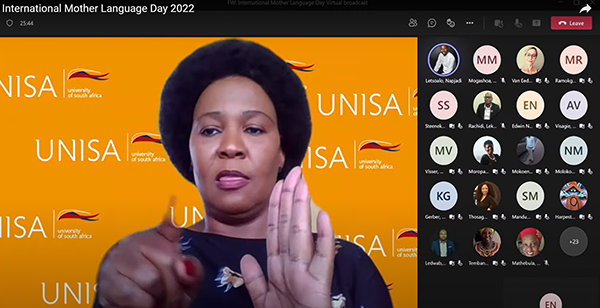News & Events
Unisa celebrates International Mother Language Day 2022
Unisa’s Language Unit, under the leadership of Professor Koliswa Moropa, in partnership with the College of Education, College of Human Sciences and Curriculum Transformation Unit, hosted a hybrid International Mother Language Day (IMLD) webinar on 21 February 2022 themed ‘Using technology in multilingual learning: Challenges and opportunities’.
This day was first announced by the United Nations Educational, Scientific and Cultural Organization (UNESCO0 in November 1999 and is commemorated annually on 21 February. The main purpose of this day is to create public awareness of linguistic and cultural diversity and multilingualism. In celebrating IMLD, Unisa’s focus was on mother-tongue-based multilingual education, the promotion of multilingualism and the potential role of technology in multilingual education.
The speakers were Professor Moroka Mogashoa, Professor Nkidi Phathudi, Professor Tintswalo Vivian Manyike, Dr Feziwe Shoba, Dr Fiona Ferris, Thabo Bogopa, Dr Hlabathi Maapola Thobejane, Patricia Mathebula, Delva Mabaso, Qhama Mati and Dr Amanda Nokele. The sign language interpreter was Sophy Mabaso. The vibrant, dynamic and eloquent programme directors Dr Napjadi Letsoalo and Mr Lekau Rachidi steered the ship with enthusiasm.
The opening address was delivered by Professor Moroka Mogashoa, the Acting Executive Director: Department of Tuition Support and Facilitation of Learning. In his address he took the audience back to the history of the colonial system whose project was the total erasure of African languages, our mother languages. He reiterated that language is about identity, existence and being. Linking his speech to the theme of the day, Mogashoa emphasised the significance of technology in language development. He said, “To avoid technology is nothing more but a suicidal existence.”

Sign language interpreter Sophy Mabaso and some of the participants at the hybrid event
The keynote address by Professor Tintswalo Manyike, Chair of the Department: Language, Education, Arts and Culture in the College of Education, was on curriculum transformation. The inclusion of previously marginalised languages in the curriculum of institutions of higher learning was strongly emphasised in her address. Manyike reminded the audience that a call for curriculum transformation and decolonisation came from students, and therefore academia should support mother tongue education. She stated that students should be allowed to use their own languages to access education and improve the pass rate and reduce the number of dropouts. The use of African languages as mediums of instructions should be realised in institutions of higher learning.
The other aim of celebrating IMLD at Unisa was to showcase what has been done in promoting multilingualism in line with the Unisa Language Policy (2016). Dr Feziwe Shoba, a language specialist in the Language Unit, gave an overview of the implementation of the multilingual policy. She shared the strides made by the institution in promoting multilingualism and the use of indigenous languages in teaching and learning, research and communication. Among the highlights was the continued development of multilingual glossaries and the translation of study material and examination question papers of at-risk modules. Unisa is also very proud of the thesis written in Tshivenda which indicates that African languages are languages of research and academia.
Dr Fiona Ferris’s presentation on language festivals at the College of Human Sciences where they visit various schools cemented the progress and commitment of Unisa in the use of multiple languages in teaching and learning. The videos of school children learning and speaking in their mother tongues was heart-warming. On linguistic and cultural diversity, Patricia Mathebula taught the audience some French, focusing on greetings and introductions. French is a world language that is offered at Unisa’s Department of Linguistics and Modern Languages.
The theme of International Mother Language Day 2022 aimed to advance multilingual education that is based on the potential role of technology to support the development of quality teaching and learning for all. The use of technology in African languages is still a challenge that requires innovative and collaborative efforts. An inspiring talk by Thabo Bogopa from the College of Law also stressed that language is not a means of communication only but can be used in other avenues such as technology and 4IR. He presented and demonstrated the innovative ways of digitising indigenous languages and using the indigenous knowledge system.
The input by Qhama Mati, Acting President of Unisa’s National Student Representative Council, confirmed the importance of learning in one’s mother tongue and the effects of this on student inclusion and success. She also reiterated that learning a language means learning one’s culture.
The day was also made vibrant by the refreshing traditional music items rendered by Matthews Mokoena. Two poets, Dr Hlabathi Maapola-Thobejane from the College of Education and a student, Thabile Moleko, not only entertained the audience, but embraced different cultures and linguistic diversity. In their poetry they emphasised that learning in a foreign language is frustrating and confusing. Dr Amanda Nokele concluded the event with a powerful vote of thanks and said that language is a tool that can be used to liberate the African people from the yoke of being servants.
Click here to watch a recording of the event.
“If you talk to a man in a language he understands, that goes to his head. If you talk to him in his language, that goes to his heart” - Nelson Mandela
* By Dr Feziwe Shoba, Language Specialist, Language Unit: Department of Tuition Support and Facilitation of Learning
Publish date: 2022-03-16 00:00:00.0

